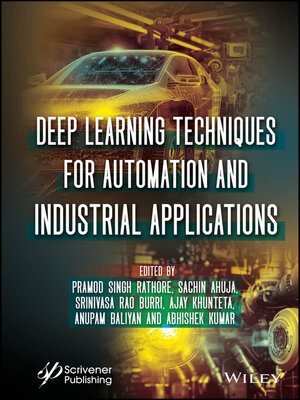
Sign up to save your library
With an OverDrive account, you can save your favorite libraries for at-a-glance information about availability. Find out more about OverDrive accounts.
Find this title in Libby, the library reading app by OverDrive.



Search for a digital library with this title
Title found at these libraries:
| Library Name | Distance |
|---|---|
| Loading... |
This book provides state-of-the-art approaches to deep learning in areas of detection and prediction, as well as future framework development, building service systems and analytical aspects in which artificial neural networks, fuzzy logic, genetic algorithms, and hybrid mechanisms are used.
Deep learning algorithms and techniques are found to be useful in various areas, such as automatic machine translation, automatic handwriting generation, visual recognition, fraud detection, and detecting developmental delays in children. "Deep Learning Techniques for Automation and Industrial Applications" presents a concise introduction to the recent advances in this field of artificial intelligence (AI). The broad-ranging discussion covers the algorithms and applications in AI, reasoning, machine learning, neural networks, reinforcement learning, and their applications in various domains like agriculture, manufacturing, and healthcare. Applying deep learning techniques or algorithms successfully in these areas requires a concerted effort, fostering integrative research between experts from diverse disciplines from data science to visualization.
This book provides state-of-the-art approaches to deep learning covering detection and prediction, as well as future framework development, building service systems, and analytical aspects. For all these topics, various approaches to deep learning, such as artificial neural networks, fuzzy logic, genetic algorithms, and hybrid mechanisms, are explained.
Audience
The book will be useful to researchers and industry engineers working in information technology, data analytics network security, and manufacturing. Graduate and upper-level undergraduate students in advanced modeling and simulation courses will find this book very useful.







